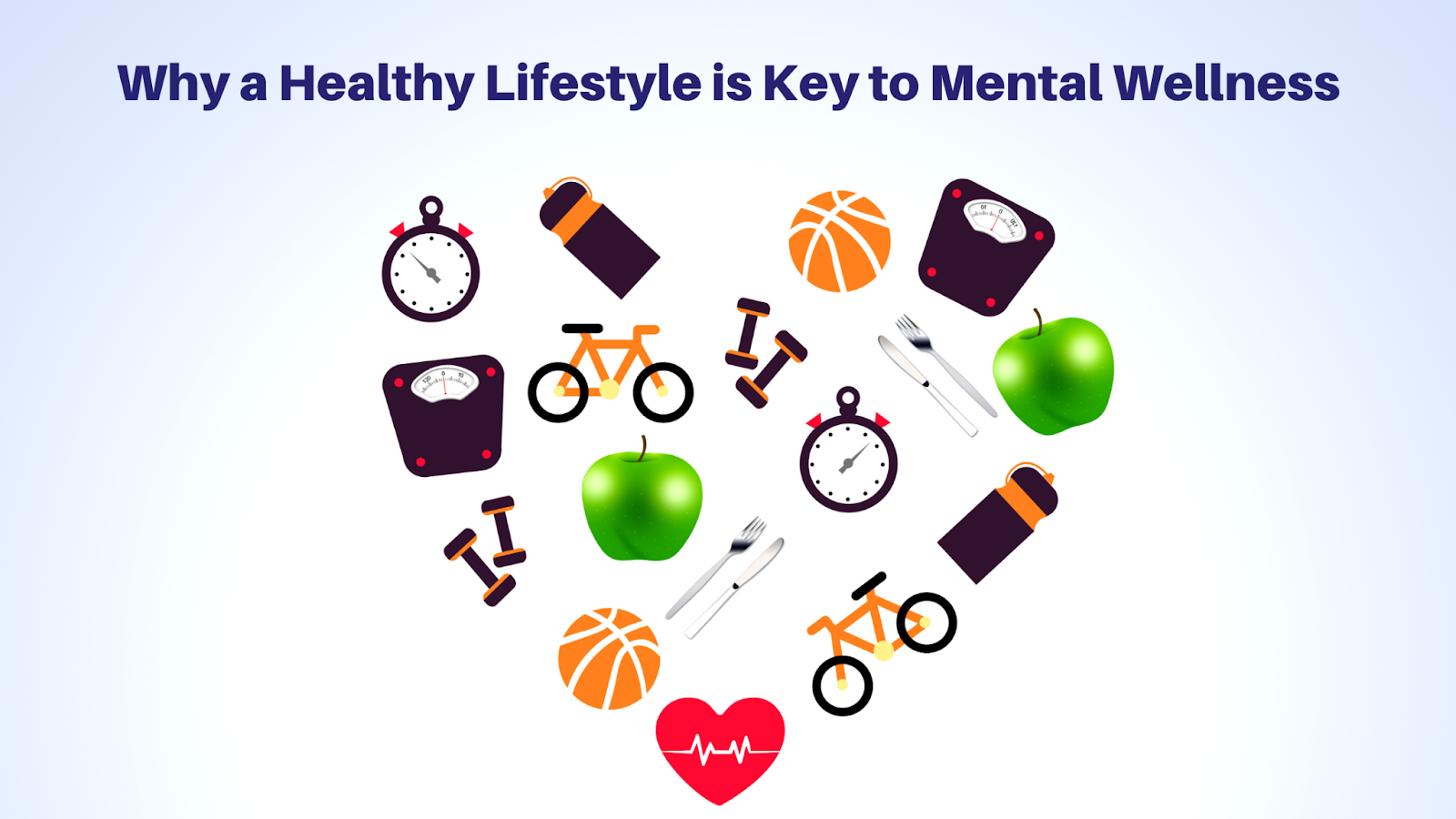Good mental health in today’s environment needs no emphasis. Estimates say that approximately 1 in every 5 adults in the U.S. nearly 43 million people experience mental illness every year, so by these numbers, we know solutions for psychological well-being are very much needed. The good news? Adopting a healthy lifestyle can have a deeply profound impact on our mental well-being.
Let’s explore how simple changes in our daily habits can lead to significant improvements in our mental health.
The Power of Physical Activity for Mental Health
Regular physical activity isn’t just good for your body; it’s a powerhouse for your mind too. Studies show that moderate to intense exercise can reduce symptoms of depression and anxiety by up to 30%. But here’s the kicker – you don’t need to run marathons to reap the benefits.
Ever heard of exercise snacks? These are short bursts of activity that can fit into even the busiest schedules. A 10-minute walk, a quick set of jumping jacks, or even dancing to your favorite song can provide an immediate mood boost and reduce anxiety.
Movement is a medicine for creating change in a person’s physical, emotional, and mental states. Try incorporating these mini workouts throughout your day:
- Take the stairs instead of the elevator
- Do some stretches during work breaks
- Walk or bike for short errands instead of driving
Regular exercise, a balanced diet, adequate sleep, and stress management techniques are all fundamental components of a healthy lifestyle that contribute to improved mood, reduced anxiety, and enhanced cognitive function. In Colorado, the emphasis on outdoor activities such as hiking, biking, and skiing provides abundant opportunities for physical exercise, which is known to release endorphins and reduce stress levels.
For those struggling with more severe mental health issues or addiction, rehab centers in Colorado offer programs that integrate physical health with mental wellness strategies. These centers often include holistic approaches, combining therapy with nutrition and fitness plans to foster a balanced and healthy lifestyle. Remember, consistency is key. Aim for at least 150 minutes of moderate-intensity exercise per week to see lasting benefits for your mental health.
Nutritional Psychiatry: You Are What You Eat
The emerging field of nutritional psychiatry is shedding light on the profound impact our diet has on our mental health. The food we consume doesn’t just fuel our bodies; it nourishes our minds too. This mind-gut connection is at the heart of how our dietary choices can influence our mood, stress levels, and overall mental well-being.
Our gut and brain are in constant communication through the gut-brain axis. This bidirectional communication system means that the state of our gut can significantly affect our mental state, and vice versa. A healthy gut microbiome, supported by a nutritious diet, can lead to:
- Reduced inflammation in the body and brain
- Improved mood stability
- Better cognitive function
- Decreased risk of mental health disorders
The Impact of Diet on Mental Health
Research has shown that a diet rich in fruits, vegetables, whole grains, lean proteins, and healthy fats can have a positive impact on mental health. Here’s how:
- Fruits and vegetables: High in antioxidants and vitamins, these foods help combat oxidative stress and inflammation, which are linked to depression and anxiety.
- Whole grains: Provide a steady source of energy for the brain and are rich in B vitamins, which are crucial for brain health.
- Lean proteins: Contain amino acids necessary for the production of neurotransmitters like serotonin and dopamine, which regulate mood.
- Healthy fats: Especially omega-3 fatty acids found in fish, nuts, and seeds, are essential for brain function and have been shown to reduce symptoms of depression.
On the other side, a diet high in processed foods, sugar, and unhealthy fats is linked to an increased risk of depression and anxiety. These foods can lead to inflammation, disrupt the gut microbiome, and cause blood sugar fluctuations that affect mood and energy levels.
Practical Tips for Eating for Mental Wellness
Remember, small changes can make a big difference. Try swapping out one processed snack a day for a piece of fruit or a handful of nuts. Over time, these small changes can lead to significant improvements in your mental well-being.
- Incorporate more whole foods: Aim to fill half your plate with fruits and vegetables at each meal.
- Choose complex carbohydrates: Opt for whole grains, legumes, and starchy vegetables over refined carbs.
- Include protein with each meal: This helps stabilize blood sugar and provides the building blocks for neurotransmitters.
- Don’t forget healthy fats: Add nuts, seeds, avocados, and fatty fish to your diet regularly.
- Stay hydrated: Dehydration can negatively affect mood and cognitive function.
- Limit processed foods and added sugars: These can contribute to inflammation and mood swings.
“Let food be thy medicine and medicine be thy food.” – Hippocrates
The Sleep-Mental Health Connection
Never underestimate the power of a good night’s sleep. Quality sleep is like hitting the reset button for your brain, allowing it to process emotions, consolidate memories, and prepare for the challenges of a new day. Sleep hygiene tips for better mental health:
- Stick to a consistent sleep schedule, even on weekends
- Create a relaxing bedtime routine
- Keep your bedroom cool, dark, and quiet
- Limit screen time before bed
- Avoid caffeine and alcohol close to bedtime
Did you know? Chronic sleep deprivation can increase the risk of developing mental health disorders by up to 50%.
Stress Management
In our high-stress world, learning to manage stress effectively is a crucial skill for maintaining mental wellness. Here are some proven techniques to keep stress at bay:
- Mindfulness meditation: Even 5-10 minutes a day can make a difference
- Deep breathing exercises: Try the 4-7-8 technique (inhale for 4 counts, hold for 7, exhale for 8)
- Progressive muscle relaxation: Tense and relax each muscle group in your body
- Journaling: Write down your thoughts and feelings to process them more effectively
Humans are social creatures, and our relationships play a major role in our mental health. Strong social connections can provide emotional support during tough times, boost self-esteem and sense of belonging, reduce stress, and promote overall well-being.
Remember, quality matters more than quantity when it comes to social connections. Reach out to friends and family regularly, join clubs or groups based on your interests, volunteer in your community, and practice active listening and empathy in your interactions.
Overcoming Barriers to a Healthy Lifestyle
While the benefits of a healthy lifestyle are clear, many of us face challenges in implementing these changes. Here’s how to overcome common barriers:
| Barrier | Solutions |
| Lack of time | Start small – even 10 minutes of exercise or meditation can make a difference |
| Low motivation | Set realistic goals and celebrate small victories |
| Limited resources | Explore free or low-cost options like walking, home workouts, or community classes |
| Unhealthy environments | Make gradual changes to your surroundings and habits |
Your Journey to Mental Wellness
Adopting a healthy lifestyle is not about perfection; it’s about progress. By making small, consistent changes in your physical activity, diet, sleep habits, stress management techniques, and social connections, you can significantly improve your mental wellness.
Remember, everyone’s journey is unique. Be patient with yourself and celebrate every step forward. Your mind and body will thank you for it.
Ready to take action? Start by choosing one area to focus on this week. Whether it’s going for a daily walk, adding more vegetables to your meals, or reaching out to a friend, every positive change counts towards better mental health.
FAQs
1. How much physical activity helps mental health?
Even small amounts of physical activity can make a difference. Studies show that just 10 minutes of moderate exercise, like a brisk walk, can immediately boost mood and reduce anxiety. For long-term benefits, aim for at least 150 minutes of moderate-intensity exercise per week, but remember that any amount of movement is better than none.
2. Can dietary changes improve mental health conditions?
Yes, research in nutritional psychiatry has shown that dietary improvements can indeed reduce symptoms of depression and anxiety. A diet rich in fruits, vegetables, whole grains, and lean proteins provides essential nutrients that support brain health. Some studies have found that following a Mediterranean-style diet can reduce the risk of depression by up to 30%.
3. What is the first step to improving your mental health?
Here are some simple steps you can take today:
- Integrate more movement into your daily routine, like taking a 10-minute walk during your lunch break.
- Prioritize sleep by setting a consistent bedtime and creating a relaxing pre-sleep routine.
- Choose whole foods over processed options for at least one meal or snack.
- Practice a 5-minute mindfulness exercise or deep breathing technique.
- Reach out to a friend or family member for a quick chat or catch-up.




